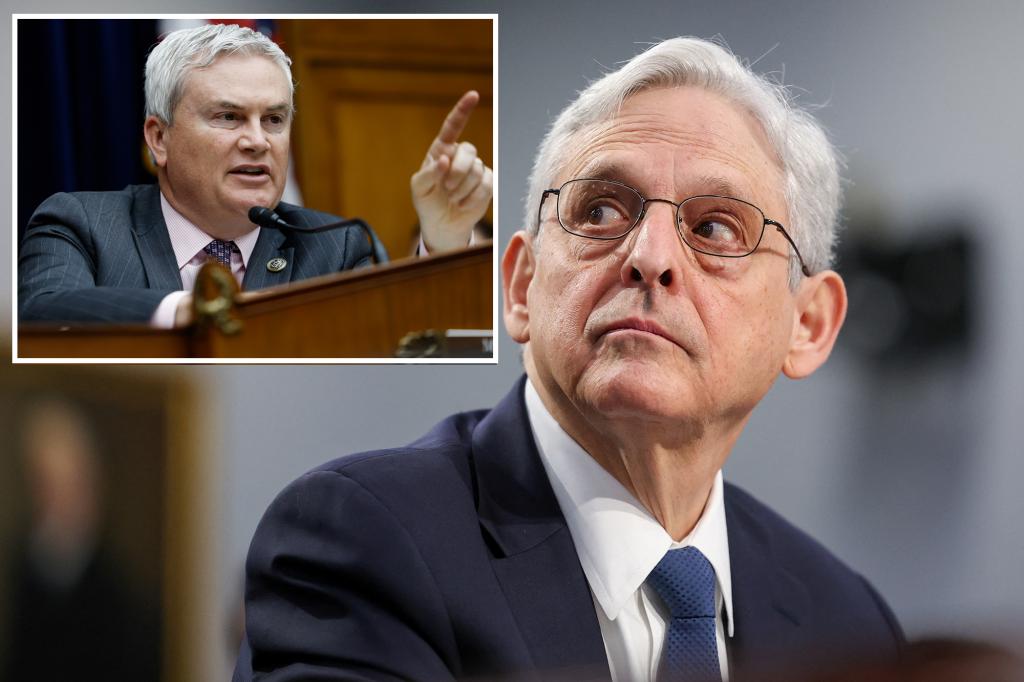The House Oversight Committee is pursuing contempt of Congress charges against Attorney General Merrick Garland for refusing to comply with a subpoena for audio recordings of President Biden’s interview with former Special Counsel Robert Hur. Hur investigated the president’s handling of classified documents, with transcripts revealing Biden’s confusion over key dates during their interactions. The Republican-controlled committee will hold a hearing on May 16 to debate and potentially add amendments to the contempt resolution before recommending it to the full House of Representatives for a vote. House Oversight Committee Chairman James Comer has emphasized Garland’s defiance of lawful subpoenas issued for the recordings.
A subpoena was issued against Garland on February 27 for transcripts, notes, video, and audio files related to Hur’s probe. The Justice Department has provided Congress with transcripts of Hur’s interviews with Biden in October, which showed the president forgetting important dates such as the year his son Beau died of brain cancer and the year Donald Trump was elected. However, the attorney general has refused to provide audio tapes of the interviews, with concerns from the DOJ that they could be used for political purposes. Comer stressed the importance of the audio recordings for investigating Biden’s handling of classified documents and his fitness for the presidency, leading to calls for consequences for Garland’s refusal to comply with lawful subpoenas.
Hur, a former Trump-appointed US attorney for the District of Maryland, submitted his findings on Biden’s handling of classified information in early February. His 388-page report highlighted evidence that the president had willfully retained and disclosed classified materials, but the team did not believe there was enough evidence to prove this beyond a reasonable doubt. The report also expressed concerns that a jury might see Biden, as the oldest president in US history, as a sympathetic elderly man with a poor memory. Despite these findings, the investigation into Biden’s handling of classified information continues to be a point of contention that has led to the current showdown between the House Oversight Committee and Attorney General Garland.
The issue of President Biden’s handling of classified information has become a focal point for the House Oversight Committee and the Justice Department. The refusal by Attorney General Garland to provide audio recordings of Biden’s interviews with Hur has led to the possibility of contempt of Congress charges being pursued. The concern over Biden’s memory lapses during his interactions with Hur and the implications for his fitness as president have further fueled the committee’s determination to obtain the recordings. As the investigation and dispute continue to unfold, the political implications of this situation could have far-reaching consequences for the Biden administration and the ongoing debate over transparency and accountability in government.
The timeline of events leading up to the current standoff between the House Oversight Committee and Attorney General Garland underscores the deepening divide over Biden’s handling of classified information. The issuance of subpoenas, the refusal to comply, and the subsequent threat of contempt charges highlight the power struggle between Congress and the executive branch over access to crucial information. The public release of transcripts from Hur’s interviews with Biden has only added fuel to the fire, with the potential for further disclosures from audio recordings heightening the stakes in the ongoing investigation. As the controversy continues to unfold, the American public is left to grapple with questions of accountability, transparency, and the political implications of the actions and decisions of its elected officials.
In the coming days and weeks, the resolution of the contempt of Congress charges against Attorney General Garland will be closely watched by lawmakers, legal experts, and the public. The outcome of the House Oversight Committee’s hearing on May 16 and the subsequent vote in the full House of Representatives could have significant implications for the Biden administration and the ongoing investigation into the president’s handling of classified information. The potential use of audio recordings from Biden’s interviews with Hur as evidence in the case further underscores the importance of obtaining this information. As the political showdown intensifies, the impact of these developments on the broader political landscape and public trust in government institutions remains to be seen.


